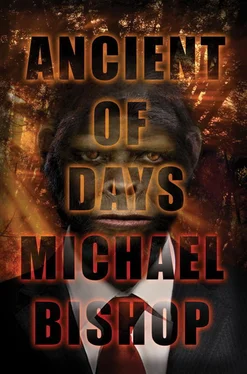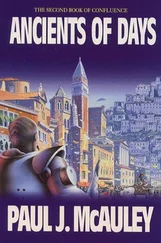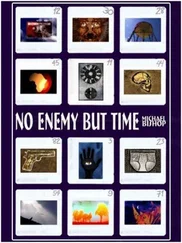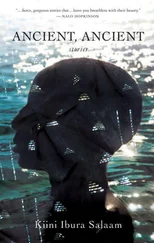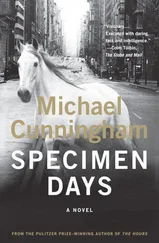Adam, looking at RuthClaire, made a bewildered hand gesture.
“I don’t know,” she replied, shaking her head.
Puddicombe slapped Adam’s hands down and told RuthClaire to hush. Teavers, a grotesque shadow, climbed into view on a nearby mound. The mounds—it struck me—resembled eroded termitaria on a dusty East African plain. For a moment, in fact, it seemed that the five of us had been translated by some fantastic agency to the continent on which Adam’s ancestors, and ours, had first evolved. Hothlepoya County was Kenya, Tanzania, or Zarakal. We were all Africans….
“Tell him to shed his clothes,” Teavers ordered RuthClaire from the mound lip.
“Why should I tell him that?”
“Do it! No backtalk!” To stress the urgency of compliance, he fired one barrel of his shotgun. The ground shook, and even Puddicombe joined us in hunching away from the blast. A pattering of buckshot sounded in the brambles of a blackberry thicket not thirty feet away. Then everything was quiet again.
Adam took off his pleated trousers by tugging down the zipper until it tore. His shirt he removed in similar fashion, popping off the buttons with his fingers. Because he disdained underwear as well as shoes, he now stood beside us as bare and unblushing as his prelapsarian namesake—just as, a year ago this September, he had first appeared at Paradise Farm. How small he seemed again, how supple and childlike.
“Okay, Craig, bring him here.” To RuthClaire and me, Teavers said, “If either of you moves, I’ll let fly this other barrel right into your hibber-lovin’ faces. Tomorrow mornin’ you’ll look like fresh ground round.”
Puddicombe laughed and nudged Adam forward. Adam seemed to grip the earth with his toes, as if hiking the high bough of an acacia tree. Although Puddicombe finally halted at the mound’s base, Adam ascended to within two or three feet of Teavers.
“Don’t,” RuthClaire said. “Don’t do it.”
Was she appealing to Adam or to Teavers? It made no difference. The young man in the gentian-violet robes dropped his shotgun, grabbed Adam by the arm, and pulled him to the lip of the vat. His intention was clear. He meant to sacrifice Adam to the Plutonian tutelaries of the pit. But, equally clearly, he had not reckoned on the sinewy strength of the habiline, believing that his own greater height and weight would suffice to topple Adam into oblivion.
But Adam, snarling, wrested his arm from Teavers, sank his teeth into the young man’s thigh through a coarse layer of denim, and spun him around like a demon astride a dervish. Teavers understood his mistake too late to do anything about it.
“Shoot!” he ordered Puddicombe. “Shoot the bastard!”
Puddicombe was of two minds, struggling both to cover his prisoners and to protect his friend. If he fired, Teavers would suffer along with Adam, and I might have a chance to jump him. As a compromise, trusting his friend to overcome Adam’s surprising resistance, he backed away from the mound and leveled both barrels of his shotgun at RuthClaire and me.
Dust billowed outward from the combat on the pit rim, a reddish-black fog in the starlight, and then both Teavers and Adam went over the edge. That was all there was to it. One moment they were grappling on the surface of their common planet, the next they were plummeting hellward as if neither had ever existed. Teavers managed a scream as he fell—a frail, short-lived protest—but Adam made no sound at all; and maybe thirty seconds after they’d begun to tangle, the night again belonged to the crickets, the stars, and the coal-sack thunderhead looming like a celestial pit over Alabama. RuthClaire and I held each other. Her hands were cold. I could feel them—their coldness—through the back of my shirt.
“I should kill you,” Puddicombe said. This development had dumbfounded him, but he tried to talk anyway. “This is your doin’, goddamn it, this is all your friggin’ fault!” His voice wavered. So did his hands. He backed away from us toward the mound, picked up Teavers’s shotgun, and tossed it into the vat that had just swallowed the two combatants. “It’s people like you,” he said, choking on the words, “it’s people like you who—” The complete articulation of this thought stymied him. He broke for the pickup, leapt into its cab, and gunned the vehicle past us, nearly striking RuthClaire. Away from the brick kiln he sped, away from the nightmare he’d helped to create.
“We must tell Nancy,” RuthClaire said, her chin on my shoulder. “Somehow.”
“Nancy?”
“Nancy Teavers. His wife. The girl who worked for you once.”
“Oh,” I said.
For a long time, we did not move. Eventually, though, I climbed the mound and peered down into the vat from my knees. I called out to Adam and Teavers. I dropped pebbles into the hole to try to plumb its depth. This was impossible, and RuthClaire told me to stop, it was no use.
Wearily, then, we set off on foot together for Paradise Farm.
It took us no more than twenty minutes to complete this journey. When we arrived, we found a twenty-foot-tall, gasoline-soaked cross of pine or some other fast-burning wood blazing on the lawn.
One horizontal strut had already burned through, making an amputee of this self-contradictory symbol, but neither of us had any doubt about its original shape. The scent of char and gasoline, coupled with the rape inherent in the cross’s placement, lifted stinging tears to RuthClaire’s eyes. She damned the people responsible. She cursed the incorrigible stupidity of her species. It began to rain. Gusts of wind whipped the flames about. The other cross arm splintered and crashed down, showering sparks.
RuthClaire and I hurried along the gravel drive to the house, where we paused to watch the storm. Lightning flickered, thunder boomed, and finally the slashing rain extinguished, altogether, the obscene handiwork of the Ku Klutzers. The Zealous High Zygote was dead, I reflected: long live Adam’s surviving descendants in universal forbearance. Ha! I mentally scoffed. Didn’t I want to kill Puddicombe? Didn’t I want a vigilante’s revenge on the cross burners?
They had cut the telephone lines. We could not phone out, me to the authorities or RuthClaire to Mrs. E. L. Teavers. Even Edna Twiggs was ignorant of our predicament—unless, of course, she’d had something to do with it. Standing in RuthClaire’s loft, trying to undress my ex-wife for bed, I suspected everyone in Beulah Fork. I had seen only eight people in robes, but I imagined every single one of my neighbors encysted in that hateful garment: a Ku Klux Kaleidoscope of suspects. RuthClaire, meanwhile, kept telling me to wait until morning to venture out, I’d be a fool to brave this storm, there was nothing we could do for Adam, the cross burners were long gone. I brought her bourbon from the kitchen and sat by her on the bed until she had swallowed the last glinting amber drop. Ten minutes later she was asleep.
I secured every window, locked every door. Then I set off through the rain to Ruben Decker’s farm, two miles down the highway. My clothes, immediately drenched, grew heavier and heavier. Two different southbound automobiles went whooshing by, hurling spray, but neither stopped, and I reached my destination waterlogged and fantod-afflicted. Like a drug dream, the image of Teavers and Adam disappearing into that hungry kiln hole kept flashing through my head.
When I knocked on Decker’s flyspecked screen door, I nearly crumpled to the porch. The sight of the grizzled dairy farmer coming toward me through his empty living room with a yearling Persian cat in his arms seemed no more substantial or trustworthy a vision than the muddled flashbacks that had accompanied me all the way from Paradise Farm.
“Got to use your phone,” I said. “Got to make some calls.”
Читать дальше
